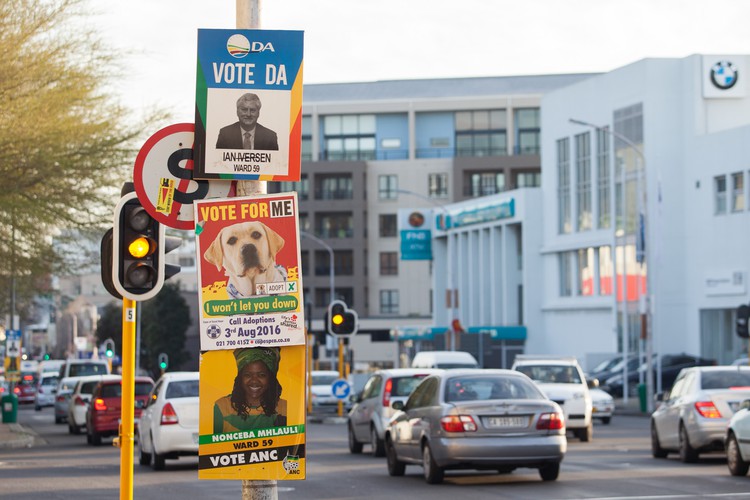
6 May 2025
The Constitutional Court has ruled that a law preventing municipal employees from holding office in political parties is unconstitutional. Archive photo: Ashraf Hendricks
The Constitutional Court has declared a law banning municipal employees from holding office in political parties unconstitutional. The law was introduced in a bid to depoliticise and professionalise the public service at local government level.
Under the Local Government Municipal Systems Act, staff of a municipality may not hold office in a political party. This follows a 2022 amendment to a 2011 version which only banned municipal managers and their deputies from holding office in a political party. The South African Local Government Association (SALGA) and the Minister of Cooperative Governance and Traditional Affairs had argued that the ban needed to be extended to all municipal employees in order to depoliticise and professionalise the public service.
In July 2023 the South African Municipal Workers Union (SAMWU) challenged the amendment in the Labour Court, arguing that it violated employees’ political rights and freedom of association.
SALGA and the minister did not dispute that political rights and freedom of association had been limited, but argued that this was justified. But in November 2023, the Labour Court found that the limitation of political rights was not justifiable and was unconstitutional.
In the view of the Labour Court, the minister had failed to demonstrate the relationship between the aim of the law — to depoliticise and professionalise the public service — and the means used to achieve that objective. The Labour Court rejected the argument that every junior employee who held a position in a political party would wield undue influence in the workplace.
The issue went to the Constitutional Court, which must confirm every decision by another court that a law is unconstitutional.
In the Constitutional Court, the minister argued that there was sufficient evidence to justify the ban. Many municipalities, the minister said, were plagued by political destabilisation which resulted in poor service delivery. Examples of the devastating effects of political interference and in-fighting could be found in eThekwini, Tshwane and the City of Johannesburg. The minister said the limitation did not stop employees from associating with a political party or participating in that party’s activities, and its impact on constitutional rights was therefore minimal.
SALGA said junior employees could wield their political influence to undermine their superiors. Only a complete ban could depoliticise local government and bring an end to continued instability and political infighting. SALGA said such employees could not simply be disciplined because the political fallout that followed disciplinary action could itself disrupt municipal governance. The Moerane Commission into political killings had recommended that government depoliticise and professionalise the public service.
SALGA also relied on a 2016 study by the Human Sciences Research Council illustrating how political infighting within municipalities is linked to service delivery failures, protests and violence.
SAMWU argued that political rights and freedom of association are connected. Preventing a person from holding a position in a political party could dissuade them from participating in party activities and even from voting, SAMWU argued. The result would be to undermine universal adult suffrage.
The union disagreed with SALGA’s argument that banning junior employees from holding political office would mean senior managers could execute their duties freely, and this would result in better service delivery. If junior employees did attempt to undermine municipal managers, the union said, the correct approach would be to take disciplinary action against them. The ban on municipal managers holding political office was enough to achieve the objective of enhancing service delivery and professionalising the public service, SAMWU argued. Extending the ban to all employees was unnecessary and unjustifiable.
A majority of the Court (Justices Rammaka Mathopo, Mbuyiseli Madlanga, Steven Majiedt, Nonkosi Mhlantla, Owen Rogers, Zukisa Tshiqi and Acting Justice Ronel Tolmay) ruled on 9 April 2025 that the absolute ban on municipal employees holding political office was unconstitutional because it unjustifiably infringed political rights.
In the majority’s view, the ban could not only dissuade participation in political parties but also undermine the constitutional value of universal adult suffrage. The judges said though the goal of the ban was laudable the means employed were unreasonable and disproportionate. The ban did not distinguish between employees who hold positions of authority and those whose political associations would have little or no influence on municipal governance.
They said they could not limit rights based on ‘the mere say-so of Parliament’. In their view the solution to addressing violence and undue influence was the deployment of law enforcement, the stringent enforcement of rules, and the disciplining of errant employees.
In a minority opinion Justices Jody Kollapen and Leona Theron said the ban should be upheld. They said a non-partisan and professional public service is a core constitutional principle; and political interference could lead to poor economic growth, the failure to alleviate poverty and the failure to address corruption. In their view the impact on constitutional rights was minimal because the ban only prevented employees from holding political office, and not from being members of political parties and participating in politics. They were unconvinced that the ban would have any impact on voting or universal adult suffrage.